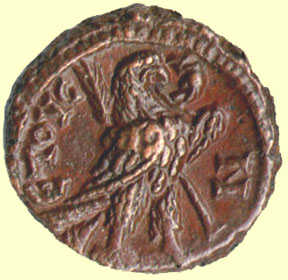 Contents -
Previous Article -
Next Article
Contents -
Previous Article -
Next Article
The touching story of brave Zenobia, Queen of Palmyra in Syria and one of the most famous women of history and legend is still popular amongst students of this period. She was wife of Odenathus, king of Palmyra. Palmyra was an important stopping point for caravans carrying trade goods along the Old Silk Road between China, Persia, and the Roman Empire. Since it also had importance as a strategic military outpost, it had been first a Roman ally and then a client state of Rome. Later, Palmyra was made part of the Roman province of Syria. Odenathus had been given the responsibility of supreme commander in charge of defense of the eastern frontier by Gallienus but his wife, Zenobia, declared Palmyra's independence after Odenathus’murder. Gallienus could not properly defend the eastern borders because he had his hands full fighting Persians, Goths, and rebels. When the rebels and the foreign invaders had been adequately dealt with by Gallienus, Claudius II, and Aurelian, the Roman army was free to turn its attention to wayward Palmyra. In early attempts to retake the province, these three emperors suffered decisive defeats at the hands of the excellent Palmyrene desert fighters. Meanwhile Odenathus had been killed in an argument while hunting and left Vabalathus, his son and heir as ruler of Palmyra under the guidance of his mother Zenobia. When Aurelian attempted to assume control of the province again, Zenobia at first asked Aurelian to declare her son "Duke of the Romans" which he agreed to. Later, she rebelled completely, setting herself up as queen of an independent Palmyra free from bondage to Roman imperialism. She was an extremely able general, inspiring loyalty in her native troops. She won several battles but could not win against the awesome renewed might of the Roman legions. She was finally captured while trying to escape across the River Orontes after having been trapped and defeated by Aurelian's army. She was taken captive back to Rome and walked in golden chains in Aurelian's triumphal parade along with Tetricus and Tetricus II. It is tempting to compare Zenobia to Cleopatra, who chose rather to die by the bite of a poisonous snake than to walk in Octavian's triumph after she had lived as queen of an independent and powerful Egypt. Unlike other emperors of the period, Aurelian was merciful and allowed Zenobia to retire to a villa in Campania as a respected Matron in Roman high society rather than execute her.
Go to next article: on Galeria Valeria
Go back to previous article: on Severina